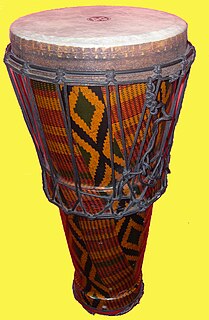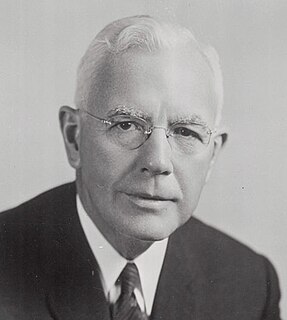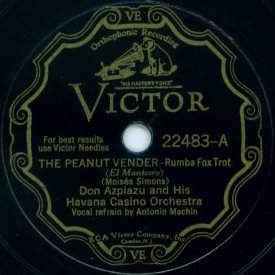
The ashiko is a drum, shaped like a tapered cylinder with the head on the wide end, and the narrow end open. It is made of hardwood and generally has a goatskin hide. It is played with the hands, and tuned by ropes. Ashiko drums – or variants thereof – are traditionally found in West Africa, as well as part of the Americas.

The blue-gray gnatcatcher or blue-grey gnatcatcher is a very small songbird, 10–13 cm (3.9–5.1 in) in length and weighing only 5–7 g (0.18–0.25 oz). Adult males are blue-gray on the upperparts with white underparts, have a slender dark bill, and a long black tail edged in white. Females are less blue, while juveniles are greenish-gray. Both sexes have a white eye ring.

Cuban cuisine is a blend of Spanish, African, and other Caribbean cuisines. Some Cuban recipes share spices and techniques with Spanish and African cooking, with some Caribbean influence in spice and flavor. This results in a blend of the several different cultural influences. A small but noteworthy Chinese influence can also be accounted for, mainly in the Havana area. There is also some Italian influence. During colonial times, Cuba was an important port for trade, and many Spaniards who lived there brought their culinary traditions with them.

A cone is an organ on plants in the division Pinophyta (conifers) that contains the reproductive structures. The familiar woody cone is the female cone, which produces seeds. The male cones, which produce pollen, are usually herbaceous and much less conspicuous even at full maturity. The name "cone" derives from the fact that the shape in some species resembles a geometric cone. The individual plates of a cone are known as scales.

A cone is a three-dimensional geometric shape that tapers smoothly from a flat base to a point called the apex or vertex.

John Alexander McCone was an American businessman and politician who served as Director of Central Intelligence from 1961 to 1965, during the height of the Cold War.

Zamia is a genus of cycad of the family Zamiaceae, native to Mexico, the West Indies, and Central and South America as far south as Bolivia. The range of one species (Z. integrifolia, extends into the contiguous United States, i.e. Georgia and Florida.

Cuba, officially the Republic of Cuba, is a country comprising the island of Cuba as well as Isla de la Juventud and several minor archipelagos. Cuba is located in the northern Caribbean where the Caribbean Sea, Gulf of Mexico and Atlantic Ocean meet. It is east of the Yucatán Peninsula (Mexico), south of both the U.S. state of Florida and the Bahamas, west of Haiti and north of both Jamaica and the Cayman Islands. Havana is the largest city and capital; other major cities include Santiago de Cuba and Camagüey. The area of the Republic of Cuba is 110,860 square kilometers (42,800 sq mi). The island of Cuba is the largest island in Cuba and in the Caribbean, with an area of 105,006 square kilometers (40,543 sq mi), and the second-most populous after Hispaniola, with over 11 million inhabitants.

"El manisero", known in English as "The Peanut Vendor", is a Cuban son-pregón composed by Moisés Simons. Together with "Guantanamera", it is arguably the most famous piece of music created by a Cuban musician. "The Peanut Vendor" has been recorded more than 160 times, sold over a million copies of the sheet music, and was the first million-selling 78 rpm single of Cuban music.

Shaved ice is a large family of ice-based dessert made of fine shavings of ice or finely crushed ice and sweet condiments or syrups. Usually, the syrup is added after the ice has been frozen and shaved—typically at the point of sale. However, flavoring can also be added before freezing. The dessert is consumed worldwide in various forms and manners. Shaved ice can also be mixed with large quantities of liquid to produce shaved ice drinks.

Shave ice or Hawaiian shave ice is an ice-based dessert made by shaving a block of ice. While the product can resemble a snow cone, snow cones are made with crushed, rather than shaved, ice. On the Big Island of Hawai'i, it is also referred to as 'ice shave'.
Santiago "Cucurucho" Santamaría was an Argentine footballer. He played primarily as a left winger.
Issac Delgado is one of the founders of the band NG La Banda and is a popular salsa and timba performer.

Conus havanensis is a species of sea snail, a marine gastropod mollusk in the family Conidae, the cone snails and their allies.
Siempre es difícil volver a casa is a 1992 Argentine comedy film co-written and directed by Jorge Polaco. The film loosely adapts the homonymous novel by Antonio Dal Masetto, who was reportedly unhappy with the final result. It is Polaco's first major studio production, featuring A-list comedians from the popular comedy troupe Trío Midachi.
La Charanga Habanera is a timba ensemble from Havana directed by David Calzado. The band has been nominated for awards including the Latin Grammy in 2003 for the album Live in the U.S.A. In 2005 Charanga Habanera was nominated for "Orgullosamente Latino" awards in three categories: best video, best album, and best group. Furthermore, the group has won numerous awards from Cubadiscos and Lucas.

Barquillo is a crispy rolled wafer pastry originating from Spain. It is made from basic cookie ingredients of flour, sugar, egg whites and butter rolled out thinly and then shaped into a hollow cylinder or a cone. It was traditionally sold by roadside vendors known as barquilleros that carry a characteristic red roulette tin. It was introduced to Latin America and the Philippines during colonial times. In Spain and former Spanish colonies, barquillos are commonly regarded as a type of Christmas cookie. It is also popular during various fiestas. It spread to neighboring countries and today are extremely popular in East and Southeast Asian countries.

Zamia integrifolia is a small, tough, woody cycad native to the southeast United States, the Bahamas, Cuba, Grand Cayman and possibly extinct in Puerto Rico and Haiti.
Pakistani Uruguayans are people born in Pakistan who live in Uruguay, or Uruguayan-born people of Pakistani descent.














